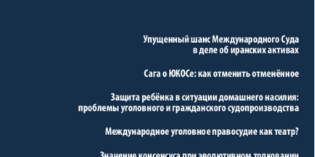Top-10 International Arbitration Developments in Russia in 2013
 2013 was an important year for international arbitration in Russia. Numerous important court judgments were rendered by the higher courts. A large-scale and ground-breaking legislative reform is underway. Some new high profile arbitrations were commenced. We have selected and summarised the 10 most important events related to international arbitration last year.
2013 was an important year for international arbitration in Russia. Numerous important court judgments were rendered by the higher courts. A large-scale and ground-breaking legislative reform is underway. Some new high profile arbitrations were commenced. We have selected and summarised the 10 most important events related to international arbitration last year.
1. Launch of legislative reform
The Ministry of Justice prepared a set of measures for the development of arbitration in Russia on the basis of preliminary elaboration with the participation of representatives from the legal community. The set of measures is aimed at solving the following problems in arbitration in Russia:
– existence of the so-called “pocket” arbitral institutions;
– lack of unified legal requirements for arbitration sufficient to prevent abuse (for both domestic and international commercial arbitration);
– lack of uniform qualification requirements for arbitrators;
– lack of uniform independent bodies for assistance and supervision in arbitration;
– lack of legal liability mechanisms in the field of arbitration;
– gaps in legal regulation of the arbitration procedure, something which reduces its (arbitration) effectiveness; and
– lack of clear regulation of the issue of the arbitrability of disputes.
2. Russian Arbitration Association established
A new ambitious arbitral institution – the Russian Arbitration Association (RAA) – was established in Russia in May 2013. The RAA includes more than 40 corporate members (Russian and international law firms) and individual members – experts in the field of arbitration. The RAA will administer ad hoc arbitrations, and carry out activities aimed at the development of arbitration in Russia.
3. Arbitration court of the Customs Union
Also in May, the Council of the Eurasian Economic Commission approved the concept of the arbitration court of the Customs Union, the text of which is available on the website of the Eurasian Economic Commission.
4. Guidelines on public policy application
The Presidium of the Supreme Arbitrazh Court of the Russian Federation approved the Review of the court practice on public policy clause application (Information letter No 156 dated 26 February 2013). The Presidium severely restricted cases of this traditionally popular ground in Russia for refusal of recognition and enforcement of international arbitral awards. However, a few months later the Presidium recognised that enforcement of awards amounting to an excessive penalty is against the fundamentals of Russian law (Resolution No 16497/12 dated 23 April 2013).
5. Fighting arbitral institutions attached to commercial organisations
The Presidium of the Supreme Arbitrazh Court of the Russian Federation continued its “holy war” against arbitral institutions attached to commercial organisations. The court declared that such courts “objectively” (as such) cannot be impartial in disputes involving parties belonging to the same group within such commercial organisation. In its Resolution No 1567/13 dated 16 July 2013, the SAC recognised that the guarantees of paragraph 1 of Article 6 of the Convention for the Protection of Human Rights 1950 (to a fair and public hearing within a reasonable time by an independent and impartial tribunal established by law) are applicable not only to the proceedings in state courts, but also to arbitration proceedings.
6. Award in favour of Yukos annulled in Sweden
On 5 September 2013, the Svea Court of Appeal overturned the arbitral award in the case of Rosinvestco v Russian Federation. The award had recognised the expropriation of YUKOS Oil company OJSC and found that Russia must pay millions of dollars in favour of one of its minority shareholders.
7. 20th anniversary of arbitration proceedings in Russia
On 4-5 July 2013, St Petersburg hosted the forum “Improving the legislation on domestic and international arbitration: modern standards and leading arbitration centres approaches”, dedicated to the 20th anniversary of arbitration proceedings in modern Russia, the 20th anniversary of the Russian Federation Law “On International Commercial Arbitration”, the 10th Anniversary of the Federal Law “On Arbitration courts in the Russian Federation” and the anniversaries of the leading Russian centres of arbitration.
8. Russian Arbitration Day
On 20 June 2013, the first international conference “Russian Arbitration Day”, aimed at the development of international commercial arbitration in the former Soviet Union, took place in Moscow. The conference was organised by the International Commercial Arbitration Court and the Maritime Arbitration Commission at the Chamber of Commerce of the Russian Federation, and was supported by law firms Berwin Leighton Paisner LLP (London) and Muranov Chernyakov and Partners (Moscow).
9. Public policy violation as the only ground for the setting aside of arbitral awards in Russia
In 2013 the Federal Arbitrazh Court of the Moscow Circuit formed a stable practice, according to which an arbitral award issued in Russia cannot be set aside unless it is contrary to public policy, and judicial control over it should be exercised at the stage of recognition and enforcement. On 10 June 2013, SAC refused to pass one such case to the Presidium for a supervisory review.
10. Arctic Sunrise arbitration
On 4 October 2013 The Netherlands filed a request for arbitration against the Russian Federation on the basis of the UN Convention on the Law of the Sea. The subject matter of the arbitration is Russian actions in respect of the ship Arctic Sunrise on which Greenpeace activists had been carrying out activities in the exclusive economic zone of Russia. Russia referred to the reservation with regard to non-arbitrable disputes it had made while ratifying the UN Convention on the Law of the Sea.
Dmitry Davydenko, Sergey Usoskin














